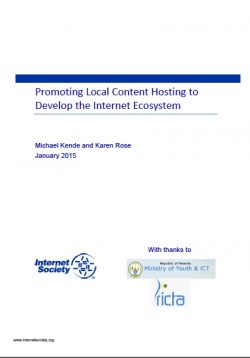In many developing countries and emerging regions the vast majority of content accessed by local users is hosted overseas. This content must traverse international links that are often expensive and sometimes under-provisioned, which can have a significant impact on the economics of access as well as the user experience. While there has been significant effort in recent years to increase the amount of locally produced content, we believe it is equally important to develop an effective enabling environment to encourage the local hosting of content, by local content developers as well as international content delivery networks, as part of efforts to more broadly develop the local Internet ecosystem.
Content providers in developing countries often choose to host content abroad in order to access lower-cost hosting services. However, this can create several challenges: it tends to impose costs on ISPs, who are faced with significantly higher transit costs to deliver the content to local users; and it means the delivery of content is much slower, giving rise to a diminished user experience. The resulting reduced usage and stifling of the Internet ecosystem can be addressed with coordinated action from key stakeholders.
This paper is an effort to begin to understand the impact of content hosting decisions, as well as develop practical guidance on creating an attractive enabling environment for local content hosting. We would stress that global hosting options have clearly been valuable for content producers, and will continue to be so as local hosting markets are further developed. In particular, we do not subscribe to arguments that content producers should be required to host locally for any reason, including economics, security or privacy. Rather, local hosting should be a viable option, whose choice by content producers alongside global options can help promote usage and development of the local Internet ecosystem more broadly.
This report is based on an in-depth case study of the local hosting dynamics in Rwanda, however, the situation outlined is common to many developing countries. As such, we believe the frameworks for analysis and lessons learned from Rwanda will assist stakeholders in other countries to assess the challenges and realise the opportunities identified here.
